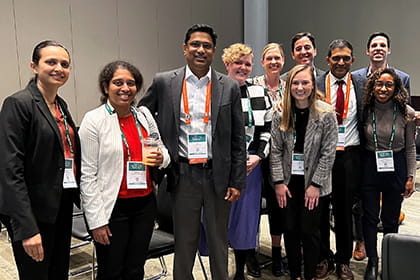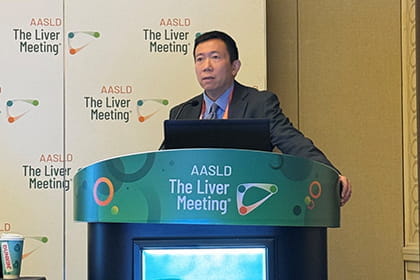Indiana University School of Medicine offers the opportunity for fellows to specialize in both general gastroenterology and transplant hepatology through an integrated three-year ACGME accredited fellowship program. This comprehensive training experience prepares fellows for leadership roles in the management of complex liver diseases and liver transplantation.
Welcome from Transplant Hepatology Fellowship Leadership
Program Director's Message
Thank you for your interest in the Transplant Hepatology Fellowship program at Indiana University School of Medicine! Our Transplant Hepatology Fellowship earned ACGME accreditation beginning academic year 2024. Our program provides an immersive combined GI and transplant hepatology clinical training experience in years two and three of GI fellowship. The combined training program meets requirements for board eligibility for certification in both general GI and transplant hepatology.
The GI division at the IU School of Medicine is one of the largest in the country and serves the only tertiary care center for gastroenterology, hepatology and liver transplantation for the state at IU Health University Hospital. Supported by a robust general hepatology program and state-wide referral network, the liver transplant program is one of the largest in the nation by volume. It provides diverse multidisciplinary learning experiences in the care of patients with advanced liver disease, and pre, peri and post-transplant care. A culture of respect and collaboration among medical, surgical and other specialties is an important strength of the program and training environment. Fellows are supported by a diverse and experienced faculty committed to their clinical education and to excellence in patient care and clinical research. Please learn more about the division's hepatology clinical care and clinical liver research programs.
Our Transplant Hepatology Fellowship provides fellows with a comprehensive educational experience in clinical training and research in a supportive environment that also prioritizes their well-being. Our aim is to help fellows reach their full potential and to prepare them for success in their careers as transplant hepatologists. The program is seamlessly integrated with the GI fellowship program and shares the core values of IU School of Medicine exemplifying excellence, respect, collegiality, integrity, and cooperation.
I, along with the division faculty and staff are delighted with your interest and look forward to hearing from you.
Associate Program Director's Message
I am excited to serve as the associate program director for the Transplant Hepatology Fellowship program. My role is to help ensure our combined GI/transplant hepatology fellows achieve their goal of becoming outstanding general GI and transplant hepatology physicians. Our program offers outstanding general GI clinical experience, excellent endoscopic training and extraordinary breadth and depth of clinical and clinical research experiences in general and transplant hepatology. My personal goal is that each combined GI/transplant hepatology fellow feels supported and has the opportunities needed to develop into outstanding clinicians, educators and/or researchers. I look forward to welcoming you to Indianapolis and the wonderful opportunities within the Division of Gastroenterology and Hepatology at IU School of Medicine!
Key Program Features
Integrated Training
Our program seamlessly combines two fellowships into a cohesive three-year curriculum, providing fellows with a robust foundation and eligibility for American Board of Internal Medicine certification in both general gastroenterology and transplant hepatology.
Expert Faculty
Fellows benefit from mentorship by renowned experts in gastroenterology, hepatology and transplant surgery. Our faculty are dedicated to providing individualized support and guidance throughout the fellowship. Fellows collaborate closely with experts across various specialties, including surgery, oncology, interventional radiology and pathology. This multidisciplinary approach enriches their training and prepares them for collaborative patient care.
Dedicated Training Facilities
Our program offers comprehensive training with a dedicated primary liver service. Fellows gain diverse clinical exposure at IU Health hospitals, and through rotations at our community hospital, Eskenazi, and the VA, encountering varied patient demographics and pathologies. As Indiana’s only liver transplant center, we successfully performed 189 liver transplants in 2023. This high patient volume ensures our trainees' exposure to a broad spectrum of liver diseases and transplant scenarios.
Clinical Excellence
Fellows gain extensive clinical experience in diverse settings, including outpatient clinics, inpatient wards and our high-volume liver transplant center. They participate in a wide range of procedures including diagnostic and therapeutic endoscopy and liver biopsies.
Comprehensive Curriculum
The curriculum covers all aspects of gastroenterology and hepatology, with a specific focus on transplant hepatology, including pre-transplant evaluation, perioperative care and long-term management of transplant recipients. Fellows engage in research projects and have the opportunity to collaborate with Division's clinical liver research team to advance the field of liver transplant and to enhance patient care.
Educational Opportunities
We offer a robust schedule of didactic sessions, journal clubs, case conferences and grand rounds. Fellows also have opportunities to attend national and international conferences to stay abreast of the latest developments in gastroenterology and transplant hepatology.



Program Structure
The three-year fellowship program is structured to provide fellows with progressive responsibility and a comprehensive learning experience.
Year one focuses on core gastroenterology training, including endoscopy skills, outpatient clinic management and inpatient gastroenterology consultations.
Years two and three includes advanced training in hepatology and transplant hepatology, with rotations through liver transplant evaluation clinics, transplant hepatology wards, and intensive care units. Further specialization is offered in transplant hepatology and leadership opportunities, including research projects, teaching responsibilities and elective rotations tailored to individual career goals.
| Training Component | Duration (4 weeks per rotation) | Details |
| Ambulatory Rotations | 6 rotations |
|
| Inpatient Primary Liver Service | 3 rotations |
|
| Liver Consult Service | 2 rotations |
|
| Transplant Surgery Service | 1 rotation |
|
| Research | 1 rotation plus interspersed research time * |
|
| Endoscopic Training | Included in ambulatory rotations |
|
| Other Endoscopy and Clinical Rotations | Included in GI rotations |
|
| Additional Activities | Throughout fellowship |
|
Want more information about the Transplant Hepatology Fellowship program?
Please contact fellowship coordinator Anna Papazian.

